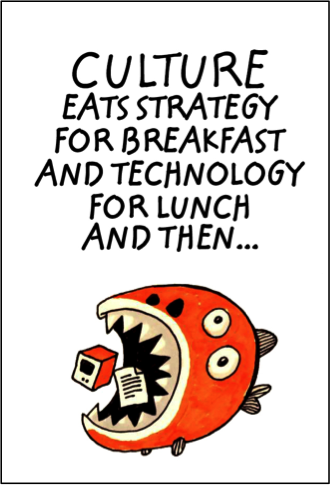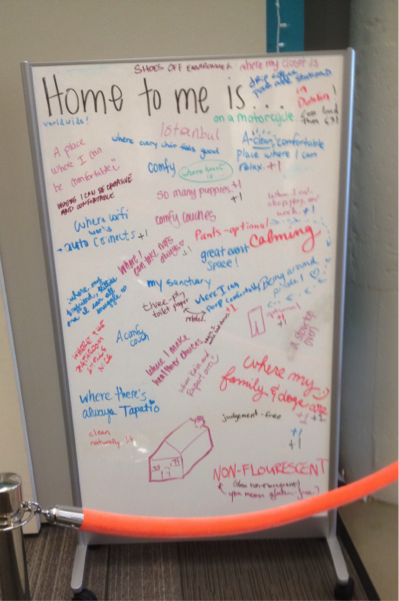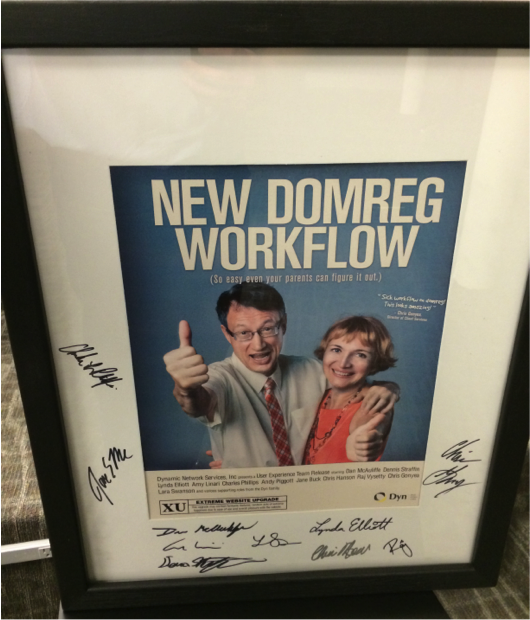Contributor
More posts from Contributor
 Editor’s note: Bill Aulet is the managing director of the Martin Trust Center for MIT Entrepreneurship and a senior lecturer at the MIT Sloan School of Management. He is the author of the recently released book, Disciplined Entrepreneurship: 24 Steps to a Successful Startup.
Editor’s note: Bill Aulet is the managing director of the Martin Trust Center for MIT Entrepreneurship and a senior lecturer at the MIT Sloan School of Management. He is the author of the recently released book, Disciplined Entrepreneurship: 24 Steps to a Successful Startup.
I used to think corporate culture didn’t matter. Discussion of vision, mission and values was for people who couldn’t build product or sell it! We had work to do and this MBA BS was getting in the way!
And then my first company failed.
Cambridge Decision Dynamics did not fail because we didn’t have a great technology or a great product or customers. It failed as a sustainable, scalable organization because we had no meaningful purpose to create team unity to fight through the tough times. Now the company sits comfortably in a perpetual state of what I like to call “deep stealth mode.”
Compare this to the rapidly growing company Eventbrite that I visited recently with some of my students. Eventbrite enables event planners to manage ticket sales and RSVPs online, and its users have sold over $2 billion in tickets.
There was palpable energy and excitement in the air when we stepped in the door. Dozens of neatly parked bicycles spanned a row next to the smiling receptionist. The employee who gave us a tour proudly showed off their conference rooms named after big events that they had helped their customers pull off, including “Promunism,” which was a Communist-themed high school prom. That room had a conspicuous red rotary phone for the emergencies that might come up in planning such a large event, a clear and visible sign linking the company to its customers in a positive manner.
A minute later, we walked by a whiteboard with the prompt “Home to me is…” that was covered with enthusiastic employee suggestions.

Being from New York, I am inherently skeptical about worlds of happiness and cohesion. But it all made sense when our host, VP of marketing, former MIT student, and single-digit-number employee Tamara Mendelsohn, came striding in the room, beaming with pride and energy, to discuss how Eventbrite went from just a few employees to hundreds and became a model of success for others in Northern California.
There was a lot of technical advice on primary market research and marketing techniques to drive market traction, but by far the most interesting part was about how the founders and the leaders of the company had consciously “engineered the company’s culture.” At first, she explained, the primary focus was testing for humility during the hiring process, and they had a checklist to enforce their “no assholes” rule. But they quickly realized they needed to do more.
As the company grew, they wanted to keep the same GSD (Get Stuff Done) attitude across the company and not let their company turn into “just another company.” This was tricky, but because the founders and employees were deeply committed to this attitude, they developed the following solution: “You can’t complain here,” Tamara explained. “If you see something wrong, you must fix it. We say it is a great opportunity to come up with a solution, and this is where many of our best programs have come from. Anything can be changed. We aren’t victim to anyone. We own the culture.”
It is no accident that such a strong culture has produced such a successful company. Event planners have enough to worry about without their ticket-sales software having problems – it needs to just work. When we have used the tool for our center’s events, we have found both a good feature set but also a super-responsive technical support team that has us covered when we screw up or don’t understand certain features. When Tamara explained Eventbrite’s culture to us, it made sense to me why their support team was so on point.
As we talk about in our classes (and credit to Peter Drucker who had the original quote which we have modified), “culture eats strategy for breakfast, technology for lunch, and products for dinner, and soon thereafter everything else too.” Why? Because company culture, a concept pioneered by Edgar Schein, is the operationalizing of an organization’s values. Culture guides employee decisions about both technical business decisions and how they interact with others. Good culture creates an internal coherence in actions taken by a very diverse group of employees.
Some may believe that culture cannot be “engineered,” and that it just happens. It is true that culture happens whether you want it to or not. It is the DNA of the company and is in large part created by the founders – not by their words so much as their actions. So the very decision to not try to create a corporate culture, or worse, to not have company values, is in fact your choice of what culture will prevail – and not for the better.
Should this have been a surprise to me? No, because for over a decade in the 1980s and early 1990s, I worked for IBM when it was the most respected, profitable and rapidly growing company in the world. From day one of training (training which lasted often for two years), the company made clear the importance of their trio of core values: respect for the individual, superlative customer service, and the pursuit of excellence in all tasks. It was this fervent adherence to these core values – through the training, the monthly communications, the performance-appraisal system, the role models, and ultimately every decision we made –that made us great.
In my later years there, I had seen a distinction erosion of management’s commitment and adherence to these values. Leaders started to cut corners on these to achieve short-term objectives, as they felt less confident in their position and felt it was more important to deliver short-term results. It was this ambiguity about these values that contributed so mightily to the fall of IBM, which led to the installment of Lou Gerstner as CEO.
As he worked to turn around the business, he came to a deeper understanding of the issue, which he voiced himself at the end of his tenure: “I came to see in my time at IBM that culture isn’t just one aspect of the game – it is the game. In the end an organization is nothing more than the collective capacity of its people to create value.”
While IBM is a large company, this pattern is true as well for the world of startups I now operate in — especially startups that want to scale. My colleague, Paul English, built a unique culture at Kayak that was the foundation of that company’s success. The founders created a system where their company culture of excellence and productivity was created from the hiring process through to operations. Meetings where decisions were to be made were to have no more than three people because then people were wasting their time. This created a culture of action and accountability while trading off consensus.
This culture does not work for all people and all companies but they made no apologies for it at Kayak and pursued it consistently. It was reinforced daily by practices ranging from Paul’s behavior, to size of conference rooms to the incentive system. The result of these efforts was that the company’s revenue per employee was $1.25 million, which was more than double the industry average. In June 2013, Kayak was purchased for $1.8 billion by Priceline.com.
Another example is a company called Dyn, which is based in Manchester, N.H. This company performs the crucial but unglamorous work of creating, managing and improving the plumbing of the Internet for users. The company’s founders believed deeply that they needed to have a strong culture. Aligning with what will create value for their customers, they focused on creating an environment that was exceptional at allowing people to be honest about their mistakes, driving them to rectify them, and then celebrate and immortalize the technical efforts that brought the solutions to life.
Again this culture was brought to life by the real estate, the way visitors were handled, the actions of the company leaders and their highly visible movie posters. An example of a movie poster is shown below. In this case, the customer had a broken workflow for registering new domains, so the employees worked on a solution that made it so easy “even your parents can figure it out.” The company then invested in creating the poster below and then having the team sign the poster. It is now permanently and prominently hung in their headquarters. It is no surprise to me that Dyn has grown from 53 employees in 2011 to 300 employees today and is considered a huge success story in an unconventional location.

Every company, especially startups, will experience random events that will help or hurt. It is impossible to fully anticipate these events ahead of time. That’s not the question. The question is how your organization will react to the series of inevitable unknown and random events.
A strong product plan is great, but it also takes strong culture to handle potentially adverse scenarios in a positive way. A positive culture like Eventbrite’s takes what would be an inherently fragile human system and makes it anti-fragile (i.e. it gets stronger with random events), to use the concept that Nassim Nicholas Taleb describes in his books. The unpredictable world of a fast-growing startup, and the daily decisions that must be made in response, tend to make the venture stronger rather than weaker or more confused.
So count me among the completely converted. When I talk to entrepreneurs now, before I get too carried away with the idea, I want to probe them about their vision, mission and values. Ideas are cheap – and tasty too. Culture eats them even before its pre-breakfast morning run.
Top illustration by Marius Ursache





























Comment